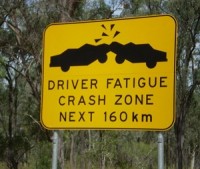Heavy vehicle driver fatigue
 Driver fatigue is a killer.
Driver fatigue is a killer.
Over the years, no doubt you have heard of tragic stories of lives being lost as a result of driver fatigue. When it comes to heavy vehicle drivers, the issue of fatigue is an oft-discussed one. Not only because of the fact that driver fatigue is a very real risk within their profession, but because the consequences of a crash involving a heavy vehicle can be very serious and destructive.
In today’s article, we’ll be discussing some of the key causes and contributing factors of heavy vehicle driver fatigue, and what drivers can do to ensure they don’t suffer from fatigue themselves.
What exacerbates driver fatigue?
When it comes to driver fatigue, there are the abundantly obvious causes such as driving for excessively long periods of time without taking a break, but there are also several factors that contribute to how quickly a heavy vehicle driver will succumb to fatigue.
Along with not taking time out to stretch your legs and rest up, a lack of food and water (or other hydrating liquids) will speed up the onset of driver fatigue. When poorly hydrated, drivers can start to suffer from headaches and exhaustion. Similarly, if not having proper food breaks, then a driver’s energy levels will diminish. With less energy, tiredness naturally follows.
The route being driven also plays a role in fatigue. Given that many heavy vehicle drivers often need to drive through rural areas across long, straight roads, this can create a sense of monotony. Because the only thing being required of the driver at that time is to drive in a straight line for potentially hundreds of kilometres, these long runs of road can have an almost hypnotising effect. Without the typical alertness that winding roads and city streets bring, monotony and, by extension, fatigue set in.
Make sure not to forget about air conditioning, either. While it is certainly good for keeping you warm in winter and cool in the summer, this creature comfort can also bring on fatigue and dehydration. While there are concerns surrounding the increase of carbon dioxide levels while using recycled/recirculated air conditioning, most vehicle manufacturers have accounted for this and ensure a little bit of fresh air still flows in from time to time.
That said, just because the issue of CO2 is better accounted for does not mean that air conditioning (recycled or incoming) doesn’t contribute to fatigue. To describe it in a basic sense, air conditioning manages to effectively heat or cool areas thanks to its ability to remove moisture. By eliminating any humidity, it then makes the process of pushing in its hot/cool air far easier, ensuring it can maintain a set temperature with ease. However, by removing the moisture from the air, air conditioning also dehydrates us. As noted, dehydration can cause headaches and fatigue. So even even if CO2 is not of your concern, then dehydration will still cause fatigue.
How to combat driver fatigue
Combating driver fatigue all comes down to knowing your limits and looking after your health. Just because you’re driving does not mean you stop eating or drinking. Be sure to take some snacks with you that you can eat along the way to keep you going, as well as water. Above all else, water is the drink you want to have with you. Then, just as you normally would, stop off for your major meals. This gives you time to relax, enjoy your meal, and recharge.
When you come across a section of your route where things may just get a little monotonous, this is where you need to do something to keep yourself alert along these long roads. As is the case with road freight transport, you unfortunately cannot have a friend with you in the passenger seat. But that doesn’t mean you can’t stay entertained. The radio, singing, and even conversing with fellow truckers via two-way radio can all help keep you connected to the world and keep that sense of monotony at bay.
With air conditioning, the solution is simple. You should use it – there’s no doubt about that. But if you start to feel a little tired or the air feels a little stuffy, wind down your windows for five to ten minutes to let some fresh air flow through. Combating hydration is all about keeping your fluids up. As long as you’ve got a good supply of water with you, you’ll be fine. If you find the air conditioning has gotten to you a little more than usual, consider pulling over, getting out of the cab and stretching your legs for a while.
For any freight job you take on, you will have a corresponding number of permitted hours for sleep. The longer your job, the more hours of rest you’ll have at your disposal. Given that these hours are calculated into the total time you have to complete your job, make sure to use them. There’s no use in tiring yourself out and putting yourself – and others – in danger just for the sake of perceived efficiency. Like any other industry, the logistics and transport industries understand the health and safety requirements that need to be adhered to. Efficiency is simply getting the job done on time, not trying to best it. So rest up and stay safe.